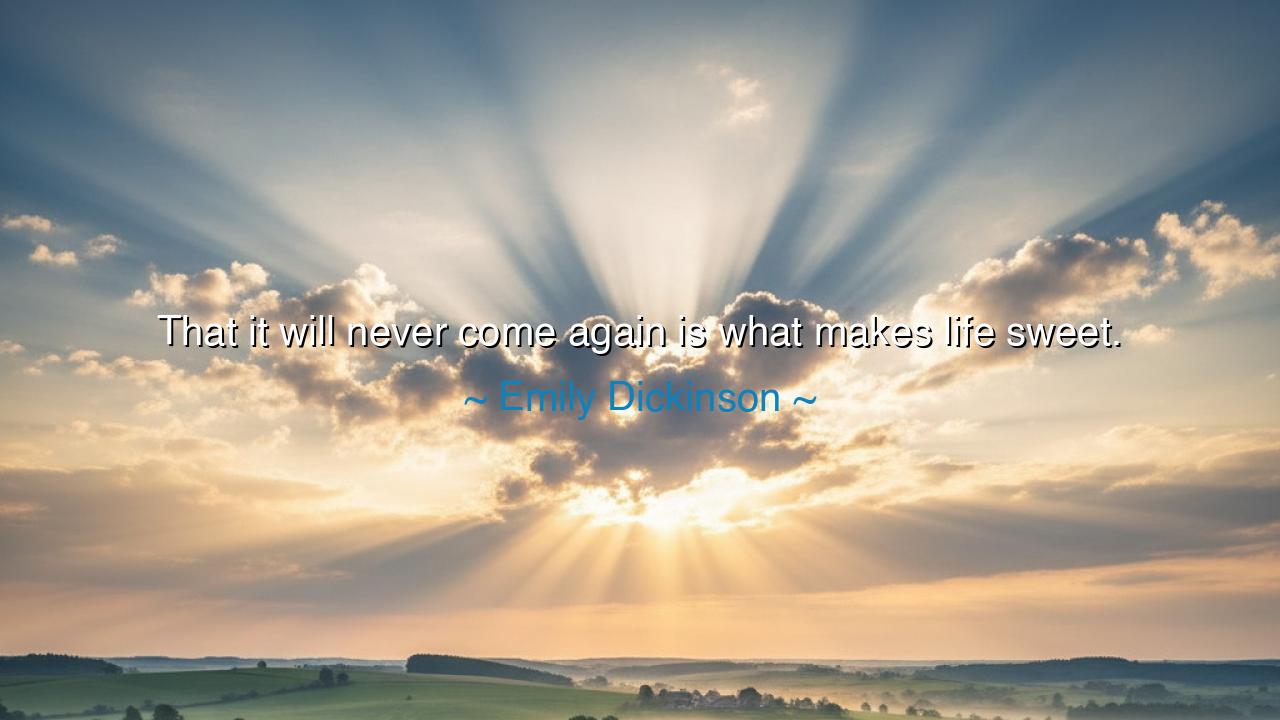
That it will never come again is what makes life sweet.






In the quiet brilliance of her solitude, Emily Dickinson once wrote: “That it will never come again is what makes life sweet.” These words, tender and eternal, hold the wisdom of one who lived close to silence and saw deeply into the heart of things. Dickinson reminds us that the fleeting nature of life — the passing of days, the vanishing of moments, the impermanence of all we love — is not a reason for despair, but the very source of beauty and sweetness. The blossom moves us because it will soon wither. The sunset arrests our gaze because it fades. The human heart cherishes because it knows it cannot hold forever.
The origin of this insight lies in Dickinson’s own life, lived mostly within the walls of her family home in Amherst, Massachusetts. Though outwardly quiet, her inner world was vast — a universe of thought, faith, and feeling. She observed life with a poet’s reverence, noting how the brevity of every joy, every sorrow, every breath, gives it weight and meaning. In a world obsessed with permanence, she saw that transience is not life’s flaw, but its perfection. To be mortal is to live in the flame that burns only once — and in that burning, to find wonder.
To understand her truth, one may recall the story of Anne Frank, the young girl who wrote her diary while hiding during the terror of war. Her life, like Dickinson’s words, was brief yet luminous. Even amid fear, Anne wrote: “Think of all the beauty still left around you and be happy.” She knew, though her world was crumbling, that beauty’s power lies precisely in its fragility. The laughter shared in confinement, the light filtering through the attic window — these things were precious because they could be lost. In this way, Anne Frank and Emily Dickinson are kindred spirits, both teaching that awareness of impermanence deepens our gratitude for every passing hour.
Impermanence, then, is not the enemy of joy — it is its seed. If life stretched endlessly and all moments could be repeated, we would no longer treasure them. A single spring blossom delights us because it will fall. The face of a loved one becomes sacred because it changes, because one day it will be gone. In every fleeting instant lies the unspoken reminder: “This will never come again.” It is that knowledge which transforms ordinary time into sacred time. To live fully, one must live with eyes open to this truth — not in fear, but in reverence.
The ancients, too, understood this paradox. The Japanese poets of old called it “mono no aware,” the gentle sadness at the passing of all things, and the sweetness that arises from that sadness. The Greeks spoke of kairos, the sacred moment that comes only once and must be seized before it fades. And the Romans carved into their tables the words “carpe diem” — seize the day — not as a call to recklessness, but as a recognition that each day is a gift unpromised. In this lineage of wisdom, Dickinson’s voice joins the chorus: to live with awareness of death is to live with gratitude for life.
Yet, in our age of hurry, we often forget this sacred awareness. We chase after eternity in the form of possessions, accomplishments, and illusions of control. But Dickinson’s whisper breaks through the noise: the sweetness of life lies not in its duration, but in its presence. To savor a single morning with sincerity, to hold a friend’s hand and truly feel it, to see the sunlight flicker on a leaf and understand that it will never shine quite the same again — these are the acts that make a life complete.
So, my children, take this teaching into your heart: cherish what is now. When you wake, remember that this dawn will never come again. When you speak, let your words carry kindness, for they may be your last to that soul. When you love, love without delay. The fleetingness of life is not tragedy — it is invitation. It calls you to live deeply, to feel fully, to taste every joy before it fades into memory.
And when the evening of your days draws near, may you look back without regret, knowing you drank from the cup of life with gratitude. For that which “will never come again” has already come once — and that is enough to make it sweet beyond measure.






AAdministratorAdministrator
Welcome, honored guests. Please leave a comment, we will respond soon